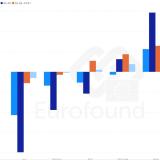
Změny na trhu práce
Zaměstnanost a trhy práce tvoří jednu ze šesti hlavních činností pracovního programu nadace Eurofound na období 2021–2024. Nadace Eurofound bude i nadále fungovat jako odborné středisko pro sledování a analýzu vývoje trhu práce, zejména v době, kdy evropské trhy práce čelí významným výzvám důsledku pandemie COVID-19. Sběr údajů a výzkum nadace se zaměří na dopady pandemie na práci a zaměstnanost a na způsob, jak udržet funkční a inkluzivní trh práce.
V období 2021–2024 poskytne výzkum nadace Eurofound významné poznatky o výzvách a vyhlídkách v oblasti zaměstnanosti a trhu práce EU. Nadace Eurofound hraje významnou roli ve sledování trendů trhu práce, jakož i sledování dopadů těchto trendů na různé skupiny pracovníků.
Výzkum se zaměří obecně na měnící se strukturu trhu práce a využije zavedené monitorovací nástroje Eurofoundu, jako je Evropský monitor práce (EJM) a Evropský monitor pro restrukturalizaci (ERM) společně s údaji Eurostatu. Vzhledem k tomu, že je v některých zemích, regionech, odvětvích a profesích očekávána vysoká míra nezaměstnanosti, která zasáhne nejvíce nejistá zaměstnání a nejzranitelnější pracovníky, pomohou tyto nástroje identifikovat rostoucí a klesající odvětví, povolání a kvalifikace. Nadace Eurofound bude nadále zkoumat rozsáhlé restrukturalizační akce, legislativní a podpůrné nástroje, jakož i opatření vypracovaná sociálními partnery a veřejnými orgány na pomoc pracovníkům při přechodu mezi zaměstnáními nebo odvětvími.
Nadace Eurofound se také zaměří na nedostatek pracovních sil a nedostatečně využívané lidské zdroje a talenty v určitých odvětvích a povoláních – který odhalila pandemie COVID-19 – zkoumáním politických zásahů a firemních postupů. Mezi konkrétními tématy bude nesoulad mezi nabízenými a požadovanými dovednostmi , pracovní doba , geografická a profesní mobilita a integrace migrantů , zahrnuto bude i téma skupin nedostatečně zastoupených na trhu práce, např. mládež, ženy a osoby se zdravotním postižením . Nadace Eurofound se také zaměří na odvětví, která jsou tradičně postižena nedostatkem pracovních sil, což je vzhledem k pandemii stále naléhavější problém. Tato činnost bude podkladem pro přípravné práce na příštím vydání Evropského průzkumu společností (ECS) .
Nadále bude v této oblasti také pokračovat spolupráce nadace Eurofound se Společným výzkumným střediskem Evropské komise (JRC). Výzkum restrukturalizace přispěje činnostem Evropského fondu pro přizpůsobení se globalizaci (EGF) a Evropského sociálního fondu+ (ESF+). Budou posouzeny vazby se sesterskou agenturou Cedefop a Evropským orgánem pro pracovní záležitosti ve vztahu k zaměstnaneckým politikám řešícím nedostatek pracovních sil.
- Infografika: Zaměstnanost a trhy práce v EU
„Šest z deseti lidí má stále smlouvu na dobu neurčitou. Přestože údaje, které máme o „atypickém zaměstnání“, jakým je například částečný úvazek a práce na dobu určitou, se v průběhu posledních pěti až deseti let příliš nezměnily, skrývají posun k více nejistým formám zaměstnání, přičemž osoby s nejistou smlouvou nemají stejný přístup k zaměstnanecké nebo sociální ochraně.“
Tina Weberová, manažerka výzkumu, oddělení zaměstnanosti






































